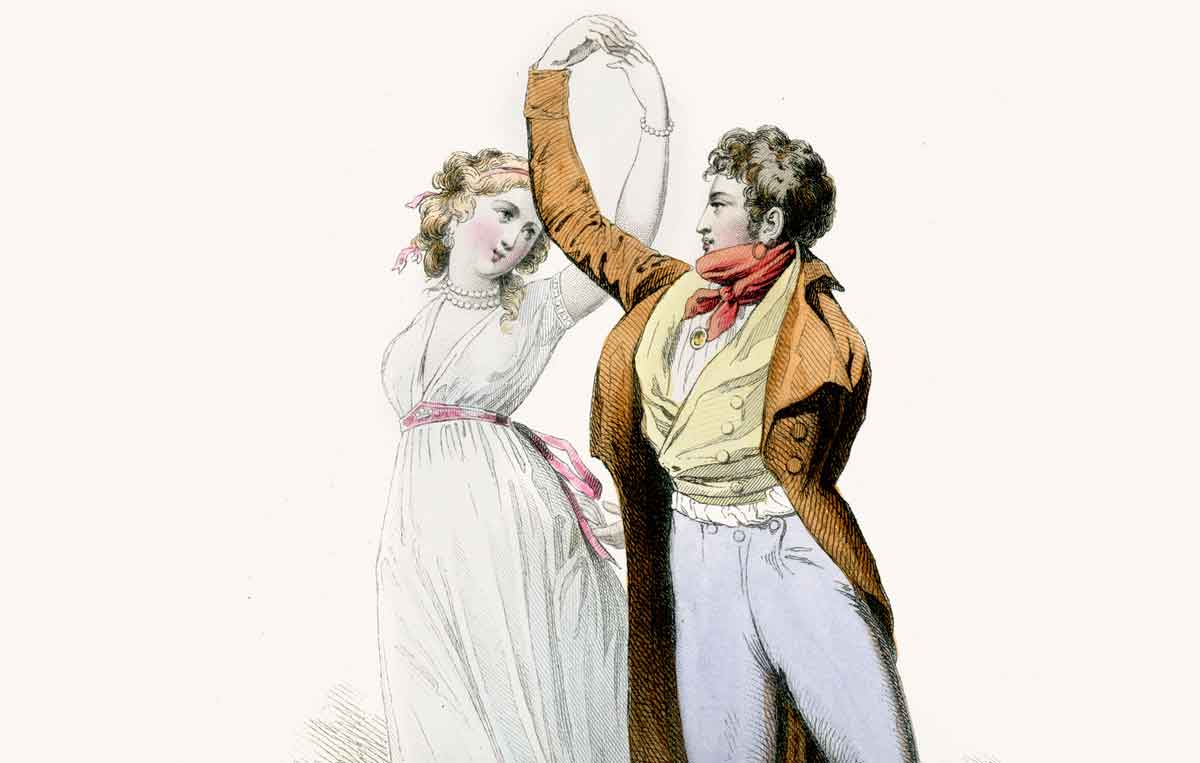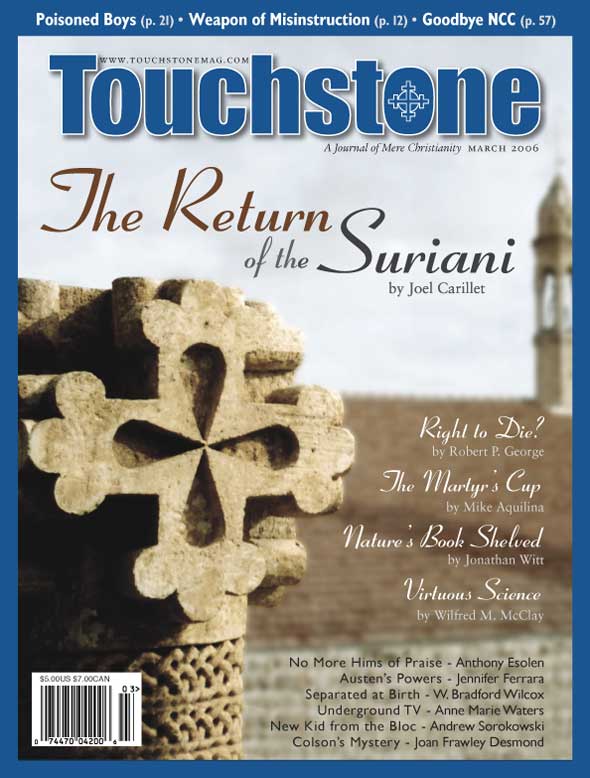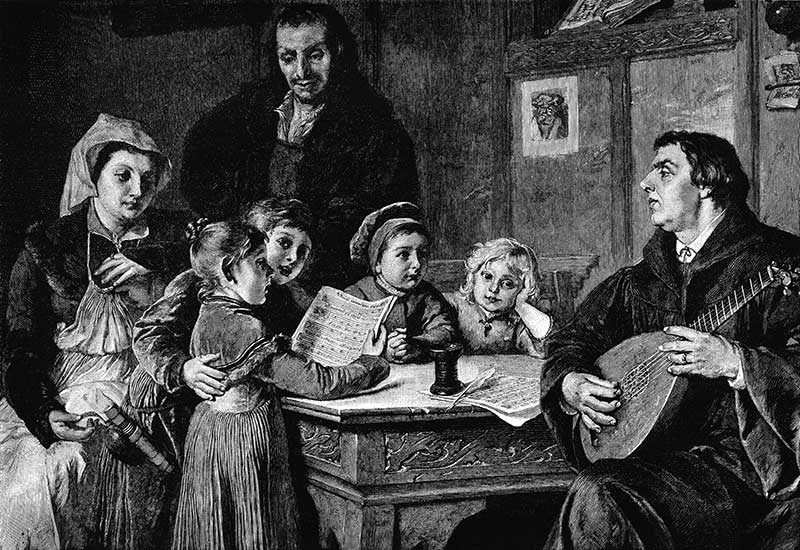View
Austen’s Powers
Jennifer Farrara on the Truths That Mr. Darcy Taught Me About Marital Love
When I was a young teenager, I saw an absolutely awful ’70s movie version of Emily Brontë’s masterpiece Wuthering Heights and was completely captivated. I read the book and was not disappointed; I fell in love with the main character, Heathcliff. He was tall, dark, handsome, and mysterious, but his most seductive quality was his wild and fierce love for one woman, Catherine Earnshaw.
I had never before encountered such passion and romance. Heathcliff was the standard by whom I would, for years, judge all of my boyfriends. They all fell short.
Heathcliff Versus Darcy
After seeing how much I enjoyed Wuthering Heights, my mother, a Jane Austen fan of the highest order, suggested I read Pride and Prejudice. I thought it a satisfying love story, but the hero, Darcy, was not nearly as interesting as Heathcliff. He was tall, dark, and handsome, but he didn’t repeatedly strike his head against a tree when Elizabeth Bennett turned down his proposal of marriage. He didn’t cease to eat and sleep when he thought he might have lost her.
In stark contrast to Heathcliff, Darcy managed to get on with things. Whereas Heathcliff allowed his estate to go to wrack and ruin, Darcy continued to run his as if nothing had happened. Therefore, he simply could not have loved Elizabeth as intensely as Heathcliff loved Cathy. Heathcliff could not live without Cathy. Never mind that he abused all others in a downright wolfish and evil manner; that only added to his allure.
Although Brontë wrote Wuthering Heights just a few decades after Pride and Prejudice was published, it is a remarkably modern novel. For Brontë, there is something virtuous about passion itself. Even though Heathcliff has “a genuine bad nature,” he is in some sense redeemed through his all-consuming love for Cathy. Anticipating the death he is convinced will reunite him with Cathy, he says, “I tell you, I have nearly attained my heaven, and that of others is altogether unvalued and uncoveted by me.” Brontë leads us to believe that Cathy and Heathcliff forever wander the moors together.
To say that Heathcliff and Cathy are soul mates is not a cliché. Cathy explains, “Whatever our souls are made of, his and mine are the same.” Or, as she declares in one of the most famous lines in English literature, “I am Heathcliff.”
As a teenager, I thought such love formed the basis of all happy marriages. Now, after twenty years of marriage, I cannot imagine Heathcliff and Cathy married. Like the love of Tristan and Isolde, theirs can only be preserved by death. It would never survive the mundane struggles of married life. Neither character would be capable of the small sacrifices necessary to make a marriage work. The only alternative to the deterioration of their love in marriage is union in death.
Brontë’s vision of love has little in common with Austen’s. In Pride and Prejudice, Elizabeth says of Lydia and Wickham, her sister and her ne’er-do-well husband, “How little of permanent happiness could belong to a couple who were only brought together because their passions were stronger than their virtue.” Austen does not deny the importance of passion, but believes, as Alasdair MacIntyre explains in After Virtue, that “morality is . . . meant to educate the passions.”
This is a difficult concept for us. Having a passion for something automatically lends it credence. We encourage our children to develop and follow their passions. We commend people for being passionate about their causes, even when we disagree with the cause.
Worse, popular culture often pits morality against passion, assuming that morality inevitably stifles passion and therefore makes people unhappy. The moral person of the average movie or novel is the narrow, joyless, frustrated, dried-up character who has never really lived. Salvation comes for him when he lets go and follows his passions, usually into the bed of someone to whom he is not married.
The Gentleman
Men can be both attractive and moral (see Colin Firth’s portrayal of Darcy in the A&E production of Pride and Prejudice), even attractively moral. True, Darcy is “haughty, reserved, and fastidious.” He is overly class-conscious even by the standards of Jane Austen’s England. Yet, these faults derive from a desire to do what is right. As he tells Elizabeth, he “was given good principles, but left to follow them in pride and conceit.” As the novel progresses, we learn, along with Elizabeth, to value his morally upright character.
Though Austen never uses the phrase, Darcy is a true Christian gentleman. He is kind and generous towards those who work for him. He is “affable to the poor.” (His class-consciousness, excessive though it is, gives him a sense of responsibility to others.) He provides for and protects those whom he loves. He is a man of great wealth, proud lineage, and social refinement, yet he has the humility to admit when he is wrong.
Unlike many of Austen’s characters, Darcy is capable of genuine love. He loves Elizabeth passionately. This capacity for love, combined with his inherent sense of morality, allows him to undergo a repentance whereby he recognizes his faults and resolves to live differently.
From Austen, we learn that morality does not stifle passion; it gives it form and meaning. The moral person is the one who enjoys the passions most deeply and satisfyingly through the whole of life. We can imagine Darcy happy at fifty, sixty, or seventy, even at forty. The same cannot be said of Heathcliff.
I long ago gave my heart to Darcy. He is not my soul mate. The need for a soul mate is highly overrated, thanks in part to Brontë and the other romantic writers.
Today, innumerable websites, books, and magazines promise to help people, mostly women, find their soul mates. All this talk about the “perfect mate”—someone with whom I connect on the deepest level, who is just like me—is misleading, New Age nonsense. Of course, two people are better off sharing the same interests, beliefs, and values, but everyone is different and everyone is a sinner. The perfect mate does not remain the perfect mate.
And more to the point, men and women are inherently different and, as some brave psychologists and sociologists now suggest, are happiest when they recognize those differences. From Austen, we learn that passions educated by morality result in marriages in which men and women live within a God-given hierarchy. In a line that must make the hair on the back of feminists’ necks stand on end, Mr. Bennett says to Elizabeth, “I know that you could be neither happy nor respectable, unless you truly esteemed your husband; unless you looked up to him as a superior.”
Superior Women
Few women will admit the need to look up to their husbands, but few are happy if they cannot. Though Hollywood and women’s magazines would have us believe otherwise, women rarely date significantly younger men. Perhaps they would if they could—if younger men found them attractive—but I doubt it. Most women still look for men to take care of them.
As Mr. Bennett suggests, the more intelligent and talented the woman, the more important it is that she look up to her husband. A marriage in which the woman feels superior to the man is an unequal marriage—one that will result in unhappiness for both the husband and the wife. Equality, that is, mutual submission and respect, occurs within the context of male headship.
The well-known psychologist Laura Schlessinger has said that in her experience women “who have reversed the traditional societal roles—that is, have a husband at home with the children—are troubled by the fact that they seem to have less regard for their husbands as ‘men.’” They have a “diminished sense of their own femininity” and feel guilty for not being the primary caregivers of their children.
Even our bodies suggest this. Schlessinger cites a major study presented at an American Heart Association forum which found that women who were in high-authority, demanding jobs suffered higher rates of heart disease than other women, although the same was not true of their male counterparts. Even more interesting is the fact that men who called themselves househusbands had an 82 percent higher ten-year death rate than men who worked outside the home.
The University of Virginia sociologist W. Bradford Wilcox reports in his book Soft Patriarchs, New Men that conservative Protestant men make their wives happier than any other kind of Protestant husband, in spite of, or really because of, the fact that their marriages are more traditional. These men are more responsive and loving as a result of their understanding of male headship.
Of course, not every man is worth looking up to. I can no longer respect a man such as Heathcliff because he is lacking in all paternal characteristics. He failed to take care of those given to his charge, including his own son. At this stage of my life, I could not possibly love a man who did not view the primary purpose of marriage to be the begetting and raising of children and his role as father to be the most important in his life.
Ridiculous Heathcliff
Heathcliff is capable of love, of a kind, but when I read Wuthering Heights recently, I found his behavior ridiculous. The love Cathy and Heathcliff have for one another is a classic case of passion without virtue. It is the kind of love that is celebrated everywhere—in books, in movies, and in the lyrics of popular songs. The fact that most people think passion is the key to marital happiness is one of the reasons why so many people divorce their spouses.
“Nearly all marriages, even happy ones, are mistakes,” J. R. R. Tolkien once wrote his son Michael, “in the sense that almost certainly (in a more perfect world, or even with a little more care in this very imperfect one) both partners might have found more suitable mates. But the real soul-mate is the one you are actually married to.”
I am not promoting marriage without passion, though we do need to be willing to soldier on during those times when passion is at low ebb. Most men and women experience times when they do not find their mates attractive. The wife gains weight and seems to do nothing but complain; the man gains weight, loses his hair, and grows ever more distant.
During those times, we must fall back on our sense of moral duty, on the promises we made on our wedding day. Far from stifling passion, morality is the surest way to restore passion to a marriage, as both spouses seek to do what is best for the other. The media gushes when people such as Brad Pitt and Jennifer Aniston marry, but their usually short marriages only serve to demonstrate that passion without morality is not even passionate, because it never lasts.
Pope Benedict XVI said when he was still Cardinal Ratzinger that love without truth is blind and truth without love is empty. This fact applies to marriage. It is not a new insight. Long ago, St. Paul wrote to the Ephesians, “Husbands, love your wives, as Christ loved the church and gave himself up for her.” For men, passion guided by morality, which is to say love guided by truth, will lead to a desire to provide and protect to the point of a willingness to give one’s life, both literally and figuratively. Darcy is an example of such a man—the type of man whom I can now love and, yes, look up to as my superior.
Jennifer Farrara , formerly an ordained minister of the Evangelical Lutheran Church in America, is a Roman Catholic laywoman. She is co-editor of The Catholic Mystique: Fourteen Women Find Fulfillment in the Catholic Church (Our Sunday Visitor).
subscription options
Order
Print/Online Subscription

Get six issues (one year) of Touchstone PLUS full online access including pdf downloads for only $39.95. That's only $3.34 per month!
Order
Online Only
Subscription

Get a one-year full-access subscription to the Touchstone online archives for only $19.95. That's only $1.66 per month!
bulk subscriptions
Order Touchstone subscriptions in bulk and save $10 per sub! Each subscription includes 6 issues of Touchstone plus full online access to touchstonemag.com—including archives, videos, and pdf downloads of recent issues for only $29.95 each! Great for churches or study groups.
Transactions will be processed on a secure server.
more on family from the online archives

33.2—March/April 2020
Christian Pro-Family Governments?
Old & New Lessons from Europe by Allan C. Carlson
more from the online archives
calling all readers
Please Donate
"There are magazines worth reading but few worth saving . . . Touchstone is just such a magazine."
—Alice von Hildebrand
"Here we do not concede one square millimeter of territory to falsehood, folly, contemporary sentimentality, or fashion. We speak the truth, and let God be our judge. . . . Touchstone is the one committedly Christian conservative journal."
—Anthony Esolen, Touchstone senior editor












